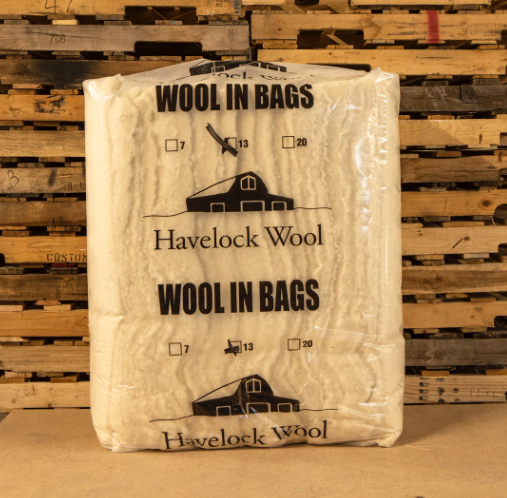NATURAL MATERIALS
Staying true to our roots in Swiss-timber framing, wherever possible in our builds, we prioritize the use of natural materials, from Mass Timber structure to wood fiber insulation. Generally, natural materials are renewable, non-toxic, and have hygroscopic properties that regulate moisture and purify the air. Natural materials also lower the embodied carbon in a building. Embodied carbon refers to the GHG emissions of a material during its lifecycle (including manufacturing, transporting, and disposal) and accounts for a significant portion of global emissions (Carbon Leadership Forum). Further, at the end of their life cycle, many natural building materials can be broken down or recycled, unlike other manufactured products like EPS.
Want to use natural materials in your project? Let us know and we’ll be happy to try and make it happen!
Insulation
High insulation value is a key Passive House building principle. There are many exciting natural alternatives for common, high embodied carbon insulation types available on the market.
Wood Fiber
Wood fiber insulation is an all natural product made from timber offcuts. It is non-toxic, making it safe for the builders and the building users. Being made from wood, it's a natural carbon sink and renewable resource. It's performance as an acoustic and thermal insulator is incredibly high (panels have an R-value of 3.8 per inch). It also has hygroscopic properties that help passively regulate moisture in the building.
We regularly use wood fiber on our projects here in the Bow Valley, including the Banff Recreation Grounds Pavilion, which will achieve Passive House Low Energy Building certification.
According to the open source BEAM tool, which synthesizes many EPDs for different products, 1 square meter of wood fiber board (at R-11) can sequester 16 kgCO2e.
Hemp
Hemp is a rapidly renewable plant with many uses in construction. Hemp fibers can be pulled into Hemp Wool, mixed with lime to form hempcrete, and manufactured into wood alternatives for flooring and baseboards. Researchers have even developed a hemp-derived rebar which does not rust (and eventually has the potential to extend the life of concrete buildings). Hemp sequesters more carbon than the same amount of wood during its growing period, and grows almost as quickly as bamboo. Hemp is a hearty plant that doesn’t require the use of pesticides, and grows readily in Canada.
Hemp Wool is produced in Canada and the United States, making it easy to supply here in the Bow Valley. It has an R-value of 3.7/inch, which is comparable to that of mineral wool, and offers a long thermal phase shift of 9-12 hours.
Hempcrete is more common in Europe, but Just BioFiber, a Calgary based company, has developed precast hempcrete blocks for structural applications.
According to the open source BEAM tool, which synthesizes many EPDs for different products, 1 square meter of hemp batt insulation (at R-11) can sequester 1 kgCO2e and 1 square meter of hempcrete (at R-11) can sequester 12 kgCO2e.
Sheep’s Wool
Those who wear wool sweaters know that sheep's wool is great at keeping you warm. It can also do the same for buildings, providing an R-value comparable to that of cellulose, mineral wool and fiberglass. Sheep's wool is a natural material made from fibers deemed too harsh for other wool products. Like other natural insulators such as wood fiber and hemp, wool has hygroscopic qualities that help control the humidity of its environment. It's also incredibly resistant to fire and mold.
Sheep’s wool is also great for air sealing and insulating small areas, like window openings, which is how we’ve used it on some of our recent projects.
Nexcem ICF
Nexcem produces the only reinforced ICF (insulated concrete forms) that do not contain foam or polystyrene. ICF is a common solution for insulating foundations and concrete walls, but the insulation used is often EPS since it does not degrade when in contact with the ground. Nexcem ICF however uses a combination of wood fibers and cement to provide a sturdy, more natural alternative to the EPS based ICF. Nexcem also uses inserts of mineral wool or cork to increase the insulation value of their forms. Nexcem is a Canadian company.
Other Natural Materials for Construction
In addition to insulation, hemp fibers can be used for finishing products and flooring.














